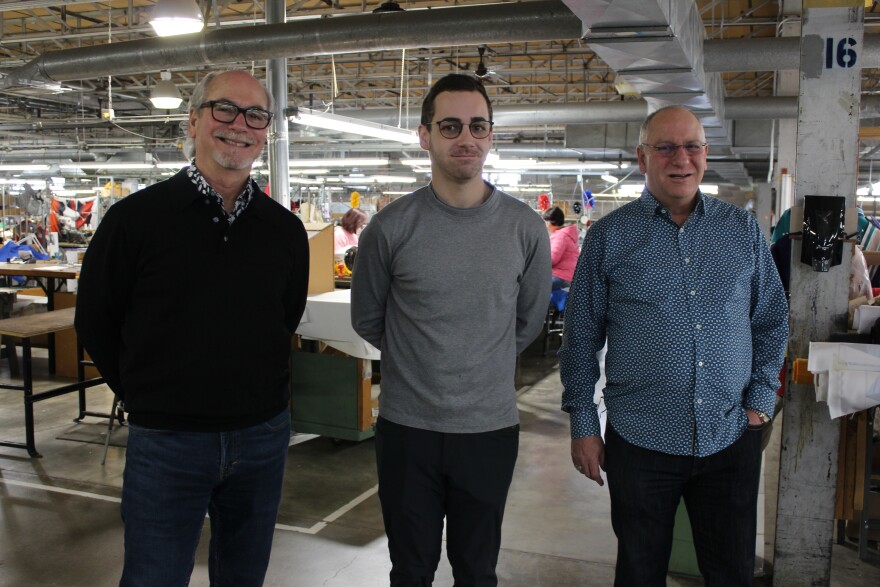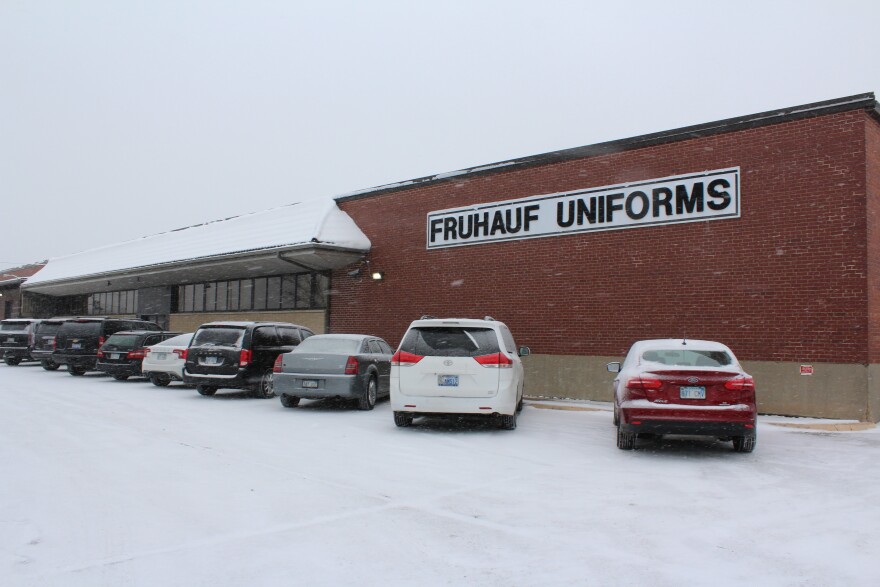Fruhauf Uniforms in Wichita survived the 1918 pandemic, the Great Depression and more recent recessions. And now, with the pandemic, it’s again finding its way through a difficult time.
The family-owned company produces high-end marching band uniforms and school banners for high schools and colleges nationwide. Business is good, but not where it should be: Fruhauf is projecting a 20% loss in sales this year because of the COVID-19 pandemic.
"Right now, our volume is down considerably from where we should be," said co-owner Kenny Fruhauf. "But we were able to keep everybody working five days a week."

Kenny and his brother Richard belong to the fourth generation of the Fruhauf family, and together they own and operate the business.
The uniform factory south of downtown Wichita, like other businesses, shut down for two months last spring due to coronavirus-related restrictions. Richard says it’s likely the first time in the company’s 110-year history that they were forced to close by no choice of their own.
“It was tough,” Richard Fruhauf said. “Not everything is the bottom line.
"You’re dealing with people and their lives."
Keeping all of their employees during the pandemic was the goal for the Fruhaufs. Though some hours were cut from 40 to about 32 hours a week, Richard says they made sure their 140 employees were taken care of by continuing pay and benefits uninterrupted during the shutdown.
“We're a family business, and we run it that way,” Richard said. “Most of our employees have been with us for over 20, 25 years. We have people that have been with us 30, 40, close to 50 years.”

He says the long-term employees provide a consistent level of expertise, experience and craftsmanship that define Fruhauf Uniforms as a national leader in the industry.
Several orders were already in production when sewing machines, steam presses and the computerized embroidery machines came to a stop.
Kenny says there was a lot of uncertainty about the business, but he knew they’d be OK. Jackets still needed sleeves. Capes were awaiting lining. And so many pieces still needed hand-sewn braids or trim.
“We didn’t really skip much of a beat when we came back in May,” he said. “We were able to keep the employment level up and keep the production flow going at full steam until pretty much September when we started to slow down quite a bit.”

When the factory reopened, it ran into trouble getting supplies. Fruhauf uses nearly 40 vendors to source fabric, thread, buttons and everything else that goes into uniform apparel and headgear. Turns out, some of those businesses didn’t reopen at the same time or took longer to recover from their pandemic crisis.
“There were quite a few delays, and there are still some delays. We were doing a major juggling act of trying to complete one set of uniforms with minimal supplies,” Kenny said.
An average order of custom uniforms takes three to four months from design to delivery. High schools and colleges spend months — sometimes years — planning their new look and securing funding. Fruhauf recently finished uniform sets for Wichita East, Rose Hill High School and the University of South Carolina.
Richard says they won’t know the full impact of the COVID-19 crisis until later this year.
“Normally, we will see an effect on our business the year after a situation,” Richard said. “Most of last year’s orders were already budgeted by the school systems. So this year is going to be the year that really tells of an up or down due to the COVID-19 crisis in our country [based on] what those schools are going to do.”

This time of year, the company is dealing with sales for August deliveries. By locking in an order now, bands would likely get their new uniforms in time for the next fall’s marching band season.
“We still have a lot of good leads. We’re working with a lot of customers,” Richard said. “The next few months are really going to tell us what our year’s going to be like.”
The Fruhauf brothers grew up in the business, watching their dad and grandfather work. They tinkered with small jobs until they were old enough to work in each department in the factory and the office. Richard says he never considered another career.

“It’s just something we always wanted to do,” Richard said. “There were, of course, maybe dreams, but not realities. It was our destiny; it’s in our blood.
"We have a long tradition and we just knew that we wanted to continue it."
He says none of the elder Fruhaufs retired and left the business. They just took a step back, and let the next generation take the lead. The Fruhauf brothers are currently preparing Richard’s son Landon to continue the family legacy.
Landon’s lesson this year: how to get through a pandemic.
“I’m just taking it a day at a time, and seeing how the vaccine rolls out,” Landon said. “Hopefully it all has a positive impact on our community and country as a whole. Hopefully, we can get back to where we were in a year or two.”







